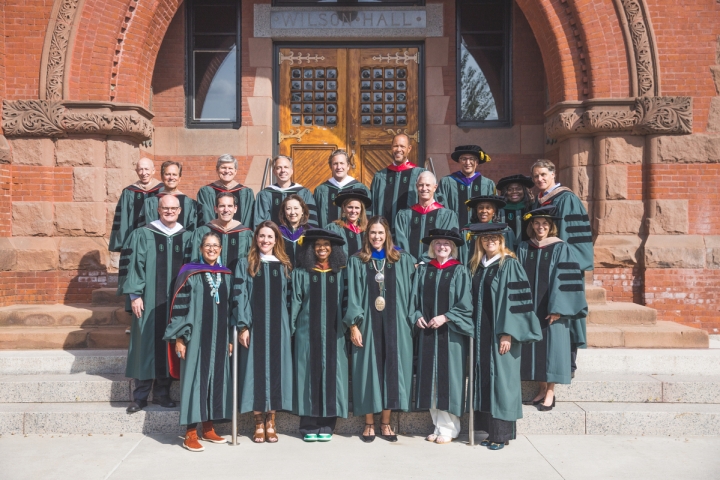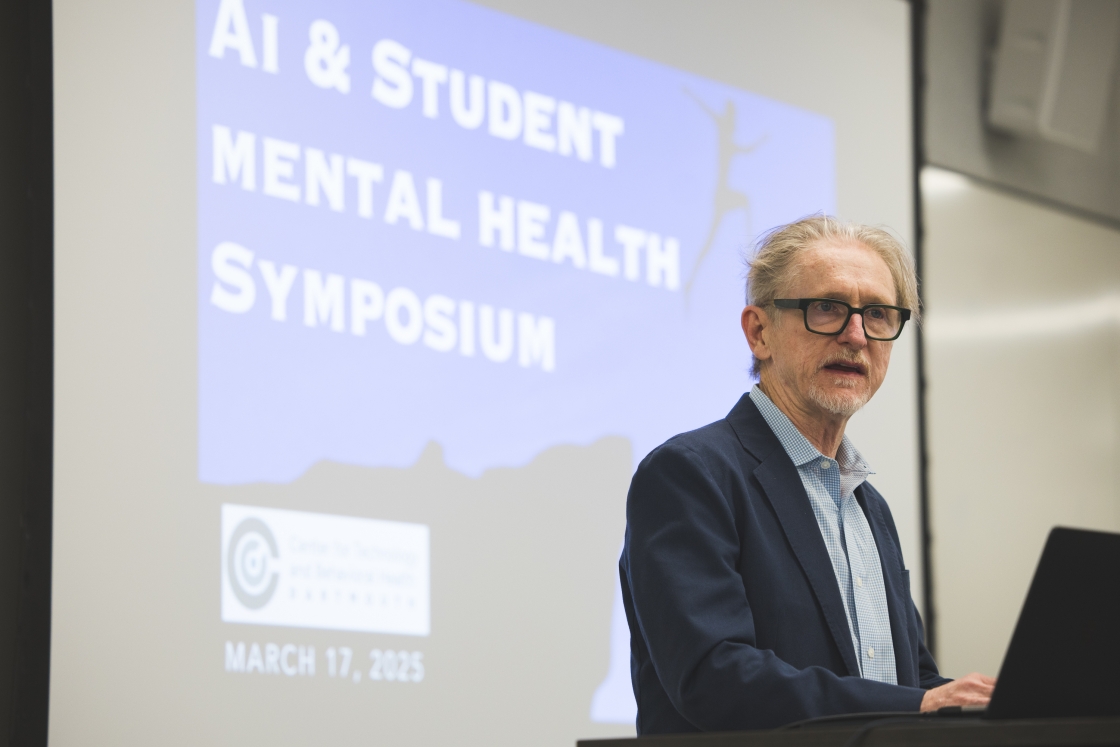On the eve of the inauguration of Dartmouth’s 19th president and the first woman to be appointed to the role, the Board of Trustees embraced the five imperatives of President Sian Leah Beilock’s new vision for Dartmouth at their annual September meeting.
They include the primacy of mental health on campus, the cultivation of “brave spaces” to encourage civil discourse and diverse ideas, action on climate change, facilitating lifelong bonds among alums to support their professional development, and breakthrough innovation with an emphasis on strategic partnerships.
Signaling their deep commitment to President Beilock’s focus on supporting and improving mental health and well-being for students, faculty, and staff across the Dartmouth community, the board held an extended discussion on an institution-wide strategic plan for mental health.
But before they began the discussion, trustees paid tribute to Eugene F. “Buddy” Teevens ’79, the Robert L. Blackman Head Football Coach, who died on Sept. 19 following injuries sustained in a bicycle accident in March. Teevens was known nationally for his practice methods to protect players from concussions. “Buddy was an original—a remarkable teacher, leader, and innovator who changed the lives of generations of students,” said Board Chair Elizabeth Cahill Lempres ’83, Thayer ’84.
Mental Health and Well-Being
The mental health plan, which will be publicly launched on Oct. 10, advances Dartmouth’s goal to be a more caring, inclusive community that prioritizes mental health and well-being and equips all of its students with the resources and skills to thrive while on campus and beyond.
“The well-being of our community is at the core of our mission, and we believe that prioritizing mental health and wellness is not just a moral imperative, but also essential for fostering a vibrant and successful academic community,” Lempres said.
In their presentation to the board, Assistant Professor of Psychiatry Matthew Duncan and JED Campus Project Manager Katie Lenhoff, who are leading the effort, highlighted some of its important components. It will include significantly expanded training opportunities for faculty and staff to enable them to better support students who come to them for help; mental health initiatives for students, faculty, and staff; expanded student mentorship programs; and the creation of metrics to track the effectiveness of outcomes.
Beilock has also created the position of Dartmouth’s first chief health and wellness officer, who will report to her on matters affecting the Dartmouth community and will oversee the implementation and assessment of the new strategic plan. Dartmouth recently rolled out a new policy for students taking time away for medical reasons that enables them to pause their studies with greater ease and stay connected to campus while they take time to heal.
“Anxiety, stress, and depression, particularly among young people, are at an all-time high, having been exacerbated by the global pandemic,” Beilock said. “Fear and dissension characterize much of our public discourse, and there are vast uncertainties about the future of our nation and the world. Our psychological well-being is directly linked to enhanced learning outcomes and academic achievement, and we need to ensure that our community members have the support they need to thrive. I look forward to the public release of the plan, which includes important steps aimed at strengthening the well-being among all our students—from first-years to the graduate and professional schools—and puts them on a path to realizing their full potential.”
Strengthening Athletics
Dartmouth’s holistic approach to wellness includes connecting it to opportunities for athletics, recreation, and exercise, which research shows improves mental health, Beilock told the board. Expanding on that theme, the trustees heard from Mike Harrity, the Haldeman Family Director of Athletics and Recreation, on his plan for varsity sports.
“The Department of Athletics and Recreation serves a critical role in supporting the institutional priority of advancing the health and wellness of the Dartmouth community,” said Harrity. “One hundred percent of Dartmouth students can experience the physical, mental, social, and emotional benefits of athletic training, competition, and teamwork. We must maintain a vision and strategy for varsity sports that align with the Dartmouth principles of academic excellence, collaboration, and experiential learning while facilitating a best-in-class athletics and recreation program.”
Harrity highlighted the importance of illustrating the connection between athletics and recreation and the institution’s mission, facilitating a culture of competition and excellence, and leading through innovation and best practices in the changing landscape of college athletics.
Communicating in Concert
Trustees heard from Senior Vice President for Communications Justin Anderson, who is leading an integrated approach to communications developed in consultation with Beilock and the academic leadership. Anderson explained the importance of communicators across Dartmouth organizing around the president’s vision and an institutional strategy to help realize Dartmouth’s goals. This more institutionally focused plan will maximize the opportunity to tell a range of critically important audiences the story of Dartmouth’s research, teaching, innovation, and impact more consistently, from every part of the campus.
Anderson said the new approach includes more formalized relationships between the Office of Communications and communications leaders at Dartmouth’s schools and centers.
“This more integrated structure will enable us to advance a presidential vision and institutional strategic plan organized around important areas of focus with newly enhanced and streamlined processes,” he said. “It will allow us to be both responsive and proactive, integrating our resources to support all schools and units. With improved access to shared communications expertise and content, more cohesive messaging, and stronger collaboration, we can tell our story more effectively while at the same time preserving the identities and goals of our schools and units.”
Support for Housing Projects
The board advanced capital projects to help address the need for new and renovated housing at Dartmouth. The trustees voted to use $3.5 million to complete the design of the Fayerweather Residence Hall renewal with funding from division/school reserves. This follows a previous vote by the board at its June meeting to approve $3 million for planning and a feasibility study of a housing project on Dartmouth property on West Wheelock Street, also funded through reserves.
“We are actively working to alleviate one of the biggest sources of stress within our campus community—housing scarcity,” said Beilock, who has announced the single largest investment in Dartmouth’s residential facilities in more than a generation, including a commitment to introducing at least 1,000 new beds for undergraduate, graduate, staff, and faculty housing before the end of the decade, breaking ground on the first of those projects for each population within the next 24 months.
“The housing crisis we face isn’t limited to our campus,” she said. “It pervades our entire Upper Valley community. So, we are also doubling our investment in the Upper Valley Loan Fund, a collective effort of the area’s largest employers to expedite the construction and preservation of affordable workforce housing.”
Making it Official: Inaugurating Dartmouth’s New President
The trustees joined students, faculty, staff, alumni, guests, and dignitaries in celebrating the installation of their new president, attending the ceremony and participating in campus-wide events and dinners over several days to mark the occasion. These included a fireside chat-style discussion of women and leadership with former PepsiCo CEO and bestselling author Indra Nooyi, an academic panel on innovation and impact, and a community cookout on Tuck Mall.
“Sian is a leader with the aspirational vision and energy to build our research enterprise, further our tradition of excellence in undergraduate education, and expand our global impact,” said Lempres. “She embraces the teacher-scholar model, understands the psychology and power of teams, and brings experience from a world-class research institution as well as a distinctive liberal arts college. We are so proud and excited to officially welcome her into the Dartmouth family and its storied succession of pioneering presidents.”
“Higher ed is often a place of singular exceptionalism,” said Beilock in her Inauguration address on Friday. “Too many times in the past, our institutions have failed to look for partners—within our own communities and even among our peers. But the best and fastest way to create new knowledge and translate it into impact is by working together, learning together, and problem-solving together.”
“So, as I accept the honor and responsibility that comes with being inaugurated as Dartmouth’s 19th president, I invite you to be my partners … to be Dartmouth’s partners … as we undertake that work. Solutions to make the world a better place are out there; we just need to accelerate their development and apply them more broadly. And I have every confidence that we can.”


